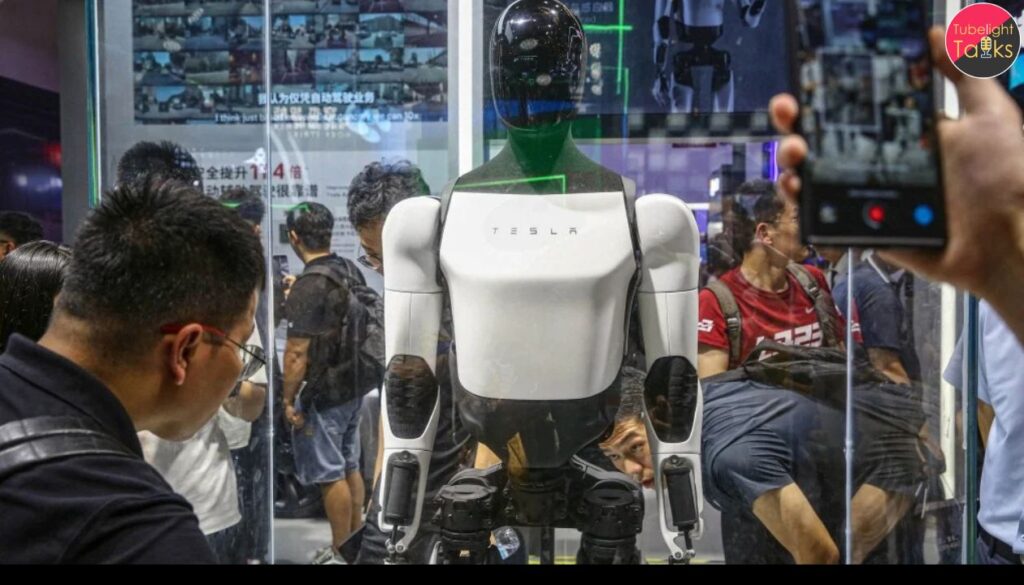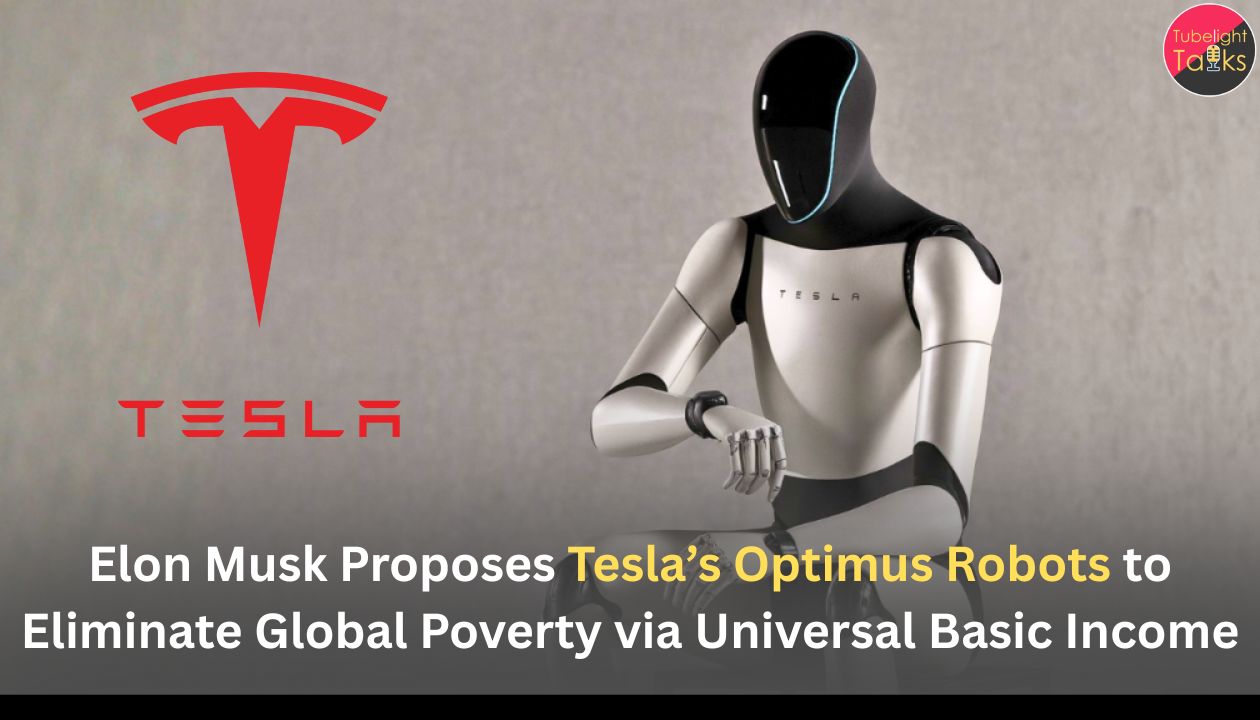Elon Musk Proposes Tesla’s Optimus Robots to Eliminate Global Poverty via Universal Basic Income
Tesla’s Optimus Robots: Tech mogul Elon Musk has once again stirred global discourse with a futuristic proposal to eliminate poverty: deploy Tesla’s humanoid robot Optimus for labor-intensive tasks while humans receive a Universal Basic Income (UBI). Speaking at the latest AI and robotics showcase, Musk argued that the convergence of automation, artificial intelligence, and sustainable energy could soon make traditional human labor optional, paving the way for an economic model centered around technological abundance.
The Core Vision: Robots Work, Humans Earn
Meet Optimus: Tesla’s AI-Powered Humanoid
- Tesla’s Optimus robot was unveiled in 2022 and has undergone several iterations since.
- It is designed to perform manual and repetitive tasks, ranging from factory assembly to domestic chores.
- With built-in AI, Optimus can navigate environments, manipulate objects, and learn routines via machine learning.
How It Replaces Human Labor
- Musk envisions large-scale deployment of Optimus in factories, agriculture, logistics, retail, and healthcare.
- By handling physical labor, humans can focus on creative, supervisory, or leisure-based activities.
“Eventually, there will be no shortage of goods or services. The only scarcity will be purpose and meaning. That’s where Universal Basic Income becomes essential.”
— Elon Musk, during Tesla’s AI Day (Nov 8, 2025)
What Is Universal Basic Income (UBI)?
Concept and Application
UBI refers to a fixed, unconditional payment made regularly to all citizens, regardless of employment status.
- Aims to reduce poverty and inequality, especially in automation-heavy economies.
- Already tested in countries like Finland, Kenya, and the US (pilot cities).
Elon Musk’s Advocacy
Musk has long supported UBI as an inevitable outcome of mass automation. Now, with Optimus scaling up, he believes the time is ripe for governments and corporations to consider a robot-powered welfare economy.

Potential Benefits of the Vision
Economic and Social Upside
- End to menial labor
- Higher quality of life with basic financial security
- Freedom to pursue art, education, and entrepreneurship
- Reduced stress and better mental health
Global Implications
- Could uplift billions from poverty, especially in developing nations
- May redefine capitalism with a tech-powered welfare approach
- Could bridge gender, class, and regional divides
Challenges and Criticism
Utopian or Dystopian?
- Critics fear mass job loss, dependency on corporations, and wealth consolidation.
- Questions arise: Who funds UBI? Who owns the robots?
- Ethical concerns include AI bias, surveillance, and exploitation.
Tech Limitations
- Optimus is still under development and not yet capable of complex decision-making or nuanced tasks.
- Large-scale deployment requires infrastructure upgrades, regulations, and workforce retraining.
“Relying solely on machines is dangerous if humans aren’t spiritually and morally guided.”
— Dr. Shalini Mehta, Tech Ethicist
Also Read: Elon Musk’s $1 Trillion Tesla Pay Plan Approved by Shareholders
The India Context: Could This Work Here?
Opportunities
- India has a massive informal workforce, making it ideal for robot-assisted economic transformation.
- Government schemes like PM Gati Shakti and Digital India could support robotic integration in logistics, warehousing, and rural development.
Hurdles
- Infrastructure gaps, income disparity, and low digital literacy.
- Concerns about data privacy, job security, and economic feasibility of UBI on such a large scale.
The Purpose Beyond Machines
In a world tilting toward automation, spiritual guidance becomes more crucial than ever. According to Sant Rampal Ji Maharaj, true peace, happiness, and purpose are not found in material ease or robotic assistance, but through spiritual awakening and devotion to the Supreme God (SatPurush).
“Machines may reduce your labor, but only Satbhakti can cleanse your soul. A society without spiritual discipline becomes hollow—no matter how advanced it becomes.”
Maharaj Ji teaches that spiritual truth leads to equitable behavior, compassion, and wise use of technology for collective good.
Explore spiritual teachings:
🔗 JagatGuruRampalJi.org
📺 Sant Rampal Ji Maharaj YouTube Channel
Call to Action: The Human Side of AI
Build a Future with Soul, Not Just Code
Demand Responsible Tech, Uphold Spiritual Values
- Support ethical AI development that serves humanity, not replaces it.
- Push for policies that ensure fair UBI, data rights, and inclusive growth.
- Balance innovation with introspection. No machine can replace a spiritually awakened mind.
Let humanity guide machines—not the other way around.
FAQs: Tesla’s Optimus Robots To Increase Poors’ Income
Q1. What is Tesla’s Optimus robot?
A humanoid robot developed by Tesla to perform manual labor tasks like lifting, walking, and handling tools.
Q2. What is Universal Basic Income (UBI)?
A fixed income given regularly to all citizens without conditions, to ensure a basic standard of living.
Q3. What did Elon Musk propose?
He proposed that robots like Optimus could take over physical labor, allowing humans to live on UBI.
Q4. Is this technologically possible yet?
Not fully. Optimus is still being developed. Mass deployment would take years and require societal readiness.
Q5. Can India implement UBI?
It’s being discussed at policy levels, but financial feasibility and social infrastructure remain big hurdles.











Discussion (0)